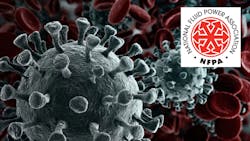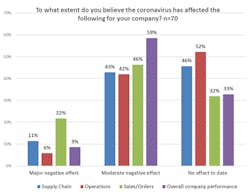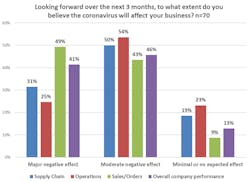National Fluid Power Association members expect a significant disruption in domestic sales, operations and supply chain over the next 90 days as a result of the global coronavirus pandemic.
A study commissioned by NFPA polled 288 of its member company leaders for their views on the impact of the pandemic, which continues to accelerate in the United States and around the world. While sales departments have seen the most immediate impact from restrictions on customer contact, travel and trade events, the fallout from these restrictions is expected to impact every aspect of the business.
The survey found the majority of companies have banned all non-essential domestic travel and almost all have banned international travel of any kind. Meetings are being conducted at a distance—even in-person, in-house meetings—and even in-person meetings are limiting the size and social distance of attendees.
The study found that 22% of respondents felt sales had been significantly impacted by the coronavirus outbreak, while only 11% said that supply chain disruption had been severely impacted and only 6% saw the same impact on operations. Between 42% and 46% of respondents said there the pandemic has had a moderate impact in all areas of company business, and 52% said there had been no impact on operations to date.
Looking ahead three months, respondents saw a much different outlook. While 23% said the pandemic would have only a minimal impact on operations, 91% said there would be a significant impact on sales, 81% saw a significant impact on supply chain and 77% saw a significant impact on operations. That led to the belief by 87% of respondents that the overall company performance would be negatively impacted.
Survey respondents discussed steps they were taking to change their operational plans, and a few comments reflected skepticism about the severity of the outbreak. Among the verbatim comments:
- “Decided to get ahead of Congress first, to expand excused absences relative to COVID-19 and second, to provide additional paid sick time relative to COVID-19, both to encourage associates to stay home if needed but still get paid for a period of time.”
- “Separating manufacturing shifts with increased time between shifts to allow for separation, washing of hands and disinfecting all areas. This allows for quarantine of only one shift if a confirmed case would be identified.”
- “We think it is not our place to lead by overacting. There are no cases nearby. We are asking those with high risk family or any other reason to let us know so we can provide them a way to isolate. We are accommodating to individuals who feel they must act. Otherwise trying to conduct business at 6-foot distance.”
- “This whole thing is lacking a sense of proportionality as it relates to the Swine Flu and other Flu outbreaks. None of those got the attention this thing is getting.”
Survey respondents encouraged NFPA officials to continue to survey and inform the organization’s members about the coronavirus outbreak and about federal relief efforts to help weather the business challenges.
Among the comments on how NFPA could help members:
- “If anything, the NFPA can do is marketing for the small businesses.”
- “Continue to share information with us on current market trend.”
- “Don’t think so, other than lobby for relief.
- “Keep the surveys going and share them; this is good useful information!”
- “Pray.”
About the Author
Bob Vavra
Senior Content Director, Power & Motion and Machine Design
Bob Vavra is the Senior Content Director of Power & Motion and its sister publication Machine Design. Vavra has had a long career in publishing, media and events. He has covered all aspects of manufacturing for the past 20 years and is a regular attendee at events such as IMTS and Hannover Messe. Vavra is also a sought-after webcast moderator and event emcee, and has presided over events in the U.S., Germany and China.

Leaders relevant to this article:


